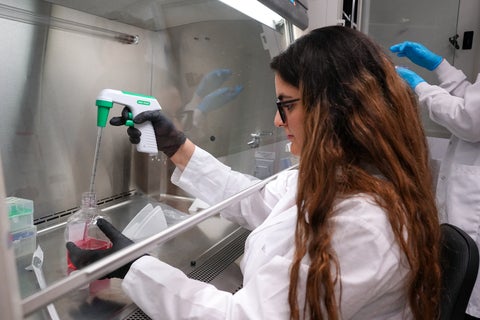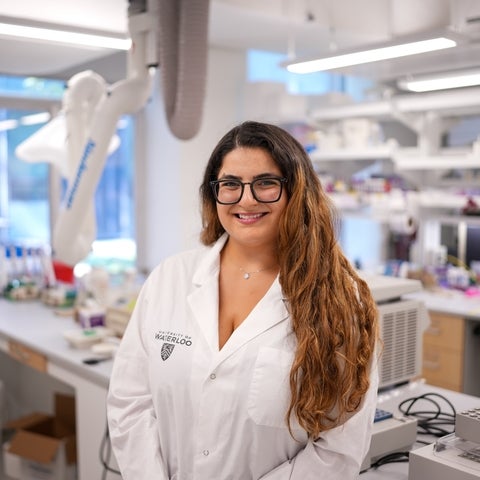
Leaving an impact on humanity through health research
By Elizabeth Kleisath
Communications Officer, Advancement
Neurodegenerative diseases have long been seen as incurable and debilitating, weighing heavily on families and communities as loved ones endure the cognitive and physical declines caused by these destructive illnesses. Despite this, researchers in the University of Waterloo’s Faculty of Science are investigating avenues of hope for those who suffer from these critical healthcare challenges, forging a path for a healthier and more prosperous future.
Yasmeen Alshehabi, BSc ’23 (Biomedical Sciences), has always known that she wanted to make a difference in the world and find a way to help others. Following her passion for human-focused biology and a desire to interact with people, Yasmeen chose to study biomedical sciences at Waterloo. During her studies, she decided to pursue an honours research project, and was surprised to discover that she loved the research side of healthcare. Now, as a graduate student, Yasmeen works at the convergence point between multiple neurodegenerative diseases, including Huntington disease (HD) and amyotrophic lateral sclerosis (ALS).
As a member of Dr. Dale Martin’s lab in Waterloo’s Department of Biology, Yasmeen has found a way to leave her mark on the healthcare community. “I have always been fascinated by the intricacies of the human brain,” she says. “It’s striking how even a small change at the molecular level can have catastrophic effects, severely affecting a person’s quality of life.”
Research in the Martin lab focuses on cellular processes that contribute to the toxic protein build-up characteristic of neurodegenerative diseases like HD and ALS. Specifically, researchers in this lab study the dysfunction of a process known as autophagy, which is the protein clearance mechanism in a cell.
During her honours research project, Yasmeen made an important discovery for ALS research. She identified the proteins mediating the palmitoylation of a major pathological protein associated with the disease. Palmitoylation, which involves the addition of fatty acids to proteins, influences protein localization within cells. Therefore, Yasmeen’s findings were key to understanding the toxic mislocalization of this protein in ALS, opening a new avenue for researchers to explore potential treatments. Her work also contributed to the Martin lab receiving a $125,000 Discovery Grant from ALS Canada-Brain Canada. “I am incredibly proud of my work, and deeply grateful for the opportunity to engage in such meaningful and impactful research.”

Now continuing her research as a graduate student, Yasmeen is working to understand and treat autophagic dysfunction by studying the palmitoylation of a key protein in autophagy. Her goal is to improve the clearance of protein aggregates in HD and ALS. To achieve this, she is investigating the potential to repurpose a pharmaceutical drug which has been previously approved for clinical use by the FDA. If her research is successful, using this drug may significantly reduce the time needed to bring this treatment to HD patients.
“Yasmeen is an unstoppable force in the lab moving this critical research forward. We wouldn’t be able to do this work without her leadership,” says Martin. “This drug is showing very promising effects in cells, and we’re excited to move this into preclinical trials.”
Yasmeen’s journey exemplifies the power of compassion, determination, and scientific innovation. Her work not only tackles complex biological challenges but also offers hope to patients and families whose lives are affected by devastating neurodegenerative diseases.
If you’re interested in learning more, don’t miss our upcoming inaugural event in the Healthy Communities Discussion Series, Bench to Bedside, on February 6, where Dr. Dale Martin will join Dr. Travis Craddock and Dr. Ben Thompson, with special guest Barbara Salsberg Mathews, as they explore cutting edge research into neurodegenerative conditions, laying groundwork to transform the healthcare sector.
For those inspired to contribute to this crucial work or other cutting-edge advances in health research currently being pursued in the Faculty of Science, we invite you to connect with the Director of Science Advancement to learn how your generosity can make a difference. Philanthropic support is transformative in advancing scientific research and enabling groundbreaking discoveries that can change lives.